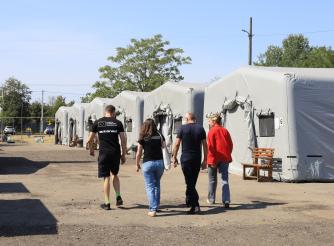Doctors in Gaza report sharp rise in severe malnutrition among pregnant women and young children

Doctors in Gaza report sharp rise in severe malnutrition among pregnant women and young children
Doctors at hospitals run by ActionAid’s partner in Gaza, Al-Awda, have reported a sharp rise in cases of severe malnutrition among pregnant and breastfeeding women and young children, as the total ban on aid continues and remaining food supplies run out.
For forty days no food, clean water, medicines or other essentials have entered Gaza after the Israeli authorities shut all border crossings and denied all aid from entering, in what amounts to the starvation and collective punishment of the population. With severe food shortages forcing bakeries and community kitchens to close and leaving markets almost depleted, people are going hungry and their health is rapidly deteriorating.
Dr Wesal Abu Laban, a paediatric and neonatal doctor and head of therapeutic nutrition at Al-Awda hospital and community association in Nuseirat, central Gaza, said the impact on pregnant and breastfeeding women was stark: “[We observed] a very large increase in the number of cases of pregnant and breastfeeding women, that had severe and moderate malnutrition. This is all a result of the last month of the siege and the closure of the crossings...All pregnant women suffer from anaemia and iron deficiency due to the lack of food or nutritional supplements. This negatively affects the pregnancy, as most [babies] are born [under] the normal weight. Most of the cases that we see now...have low birth weights under 2.5 kilograms. Of course, it has a close relationship with the nutrition of the pregnant mother herself.
“[There are also] cases of miscarriage and bleeding that occurs with [women] because they have anaemia while they are pregnant.”
A recent survey by the Nutrition Cluster found that between 10 and 20 per cent of pregnant and breastfeeding women were malnourished, while one third of Gaza’s estimated 55,000 pregnant women face high risk pregnancies. Doctors in Gaza are delivering around 130 babies every day, yet vital medical supplies – including anaesthesia for delivery and pain management, antibiotics, and blood units required for complicated deliveries – are running critically low, according to the WHO.
Dr Mohammed Salha, acting director of Al-Awda Hospital in northern Gaza, said: “At Al-Awda Hospital, every day more than 150-200 women are coming [for maternity services]. Every day our staff are discovering cases of malnutrition related to [the lack of] food...It’s threatening their lives. Pregnant women need to have food to [prevent] malnutrition.
“This month, more than 35% of women are having caesarean sections. It’s a huge number...The normal [amount] is between 20-22% percent.”
Malnutrition is also rising among young children, with Gaza’s health ministry estimating that as many as 60,000 children are at risk of experiencing severe health complications due to malnutrition. At the same time, access to treatment has diminished: UNICEF has been forced to shut down 21 of its malnutrition centres as a result of Israeli military bombardment or forced displacement orders, interrupting treatment for hundreds of children.
Dr Abu Laban said: “Almost a month ago, we started noticing an increase in cases of severe and moderate malnutrition in children between six months and five years old. [Since then], there [has been] a deterioration, which means even the cases that were followed up with us previously and improved [have] started to [worsen], such as cases [of] severe malnutrition, which became moderate, then returned again to the severe state. Admission to the therapeutic nutrition centre [also] began to increase.”
While the health needs of the general population soar, Gaza’s overwhelmed health system is also receiving dozens of patients injured in Israeli military strikes each day. Intensive attacks – including on schools used as shelters, residential blocks and tented encampments – have killed more than 1,500 people in just over three weeks, adding to the total death toll of more than 50,000, with at least 100 children killed or injured every day, according to the UN. Almost 400,000 people have been displaced, yet again, despite there being nowhere safe in Gaza to go nor anywhere they can find food, adequate shelter, or any of the essentials needed to survive.
Riham Jafari, advocacy and communications coordinator at ActionAid Palestine, said: “Almost six weeks after aid into Gaza was entirely and deliberately cut off, the consequences of this outrageous and illegal decision are becoming devastatingly clear. Severe malnutrition is rising among pregnant women – putting their own and their baby’s life at risk – and young children, with disastrous life-long implications for their health. Every day that the aid blockade continues, this horrific reality is compounded.
“The time for condemnation is long past. Those in Gaza not killed by the relentless daily bombing attacks now face the very real risk of starving to death. The international community must act now to put a permanent end to this war, as well as ensure the full withdrawal of the Israeli military from Gaza, as stipulated in the ceasefire agreement. Life-saving aid must enter Gaza immediately and at scale, to stop the humanitarian catastrophe from deepening any further.”
[ENDS]
Spokespeople are available for interview, and photos, testimonies and video footage are available on request. Please contact the press office at media-enquiries@actionaid.org to arrange.


